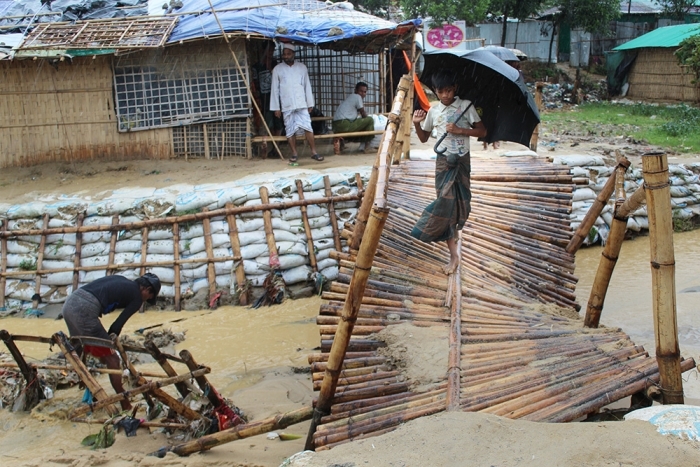First monsoon rains hit Cox’s Bazar

Heavy rains hit Cox’s Bazar on Saturday 9th June and have continued to cause severe disruption to the Rohingya refugee camps in the area.
The camp is home to approximately 1 million people, 31,000 of which are living in areas that are considered at high risk of deadly flooding and landslides.
Reports suggest that 12 people have been killed due to heavy rain in the camp since Monday 11th June.
Within 24 hours of Saturday’s rainfall humanitarian agencies reported 59 incidents including landslides, water logging, and extreme wind and lighting effecting over 9,000 people. The incidents are being mapped and shared on an interagency platform.
A number of humanitarian agencies are urgently working to secure infrastructure, including road access and drainage, and improving overall preparedness. The IOM is working with its partners to ensure refugees receive lifesaving assistance, such as water, sanitation, hygiene, health, protection and shelter support.
However, there are still significant risks due to the large size of the camp and the high level of overcrowding. In addition, the camp has been constructed on hilly terrain which has little vegetation, making the soil very unstable.
Since January 2018 25,000 individuals vulnerable to flooding and landslide or in areas of communal infrastructure construction have been moved to safer ground. Before the end of June a further 7,248 individuals will be relocated.
Teams from the IOM are constantly preparing new land to relocate more vulnerable people.
Manuel Pereira, IOM's Emergency Coordinator in Cox's Bazar, commented:
"The situation in the camps is growing more desperate with every drop of rain that falls”
"You have close to one million people living on hilly, muddy terrain with no trees or shrubs left to hold the ground in place. People and their makeshift shelters are being washed away in the rains. We are racing to save lives, but we urgently need more funding to maintain and expand key humanitarian support during these rains. Without this, our operations, which are currently only 22 percent funded, will run out of money by the end of this month”
Last week the IOM warned that crucial health services in Cox's Bazar could be cut due to funding issues.
The IOM, WFP and UNHCR have also positioned heavy machinery in key locations to enable quick response time to disasters.
Existing shelter has also been upgraded to better withstand heavy rain and wind, and refugees have also been given advice on how they can reduce their vulnerability.
The Rohingya refugee crisis in Asia will be a key discussion point at the upcoming AIDF Asia Summit, taking place on 20-21 June 2018 in Bangkok, Thailand.
If you’d like to stay informed on the latest updates in aid and development, please sign up for the AIDF newsletter.















